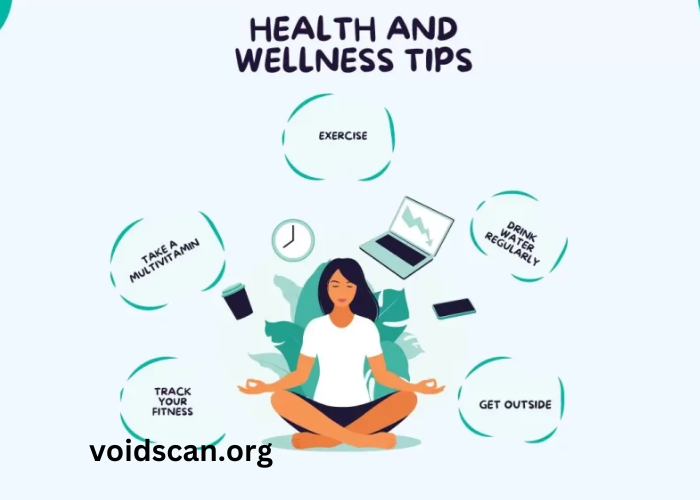
In today’s fast-paced world, maintaining a healthy lifestyle has become more crucial than ever. The demands of work, family, and social obligations often leave little time for self-care, resulting in stress, unhealthy habits, and even burnout. However, living a balanced life is essential for long-term health and well-being. A balanced lifestyle helps improve physical and mental health, boosts productivity, and reduces the risk of chronic diseases.
A balanced lifestyle involves taking a holistic approach to health by addressing the mind, body, and spirit. It’s about finding harmony between work, rest, exercise, nutrition, and emotional well-being. Whether you’re looking to improve your fitness, manage stress, or simply feel better in your day-to-day life, following key health tips can make a significant difference.
In this article, we will discuss essential health tips for maintaining a balanced lifestyle that can help you lead a healthier, more fulfilling life.
1. Prioritize Regular Exercise
Physical activity is one of the cornerstones of a healthy lifestyle. Regular exercise helps maintain a healthy weight, reduces the risk of chronic diseases, and improves mental health. Whether you enjoy running, swimming, yoga, or simply taking a walk, incorporating physical activity into your daily routine is vital for overall well-being.
Experts recommend at least 150 minutes of moderate-intensity aerobic activity or 75 minutes of vigorous-intensity activity each week, along with strength training exercises twice a week. Exercise not only keeps the body fit but also boosts mood by releasing endorphins, the “feel-good” hormones.
2. Eat a Balanced Diet
Nutrition plays a crucial role in maintaining a balanced lifestyle. A healthy, well-rounded diet provides the essential nutrients your body needs to function at its best. Eating a variety of fruits, vegetables, whole grains, lean proteins, and healthy fats ensures that your body receives the vitamins, minerals, and macronutrients it requires.
Aim for a balanced plate by including different food groups in every meal. Avoid highly processed foods, sugary snacks, and excess amounts of unhealthy fats. Instead, focus on whole, nutrient-dense foods that support energy levels, immune function, and overall health.
3. Stay Hydrated
Water is essential for almost every function in the body, including digestion, temperature regulation, and nutrient transportation. Dehydration can lead to fatigue, poor concentration, and headaches, so it’s crucial to drink enough water throughout the day.
The amount of water you need depends on your age, activity level, and climate, but a general rule of thumb is to drink at least eight 8-ounce glasses of water a day. Keep a water bottle with you to remind yourself to stay hydrated, especially when you’re on the go.
4. Get Quality Sleep
Sleep is the body’s natural recovery process, and getting enough rest is essential for maintaining a balanced lifestyle. Chronic sleep deprivation can lead to a host of health problems, including weakened immune function, increased stress, and impaired cognitive function.
Aim for 7 to 9 hours of sleep per night. Develop a bedtime routine that helps you unwind, such as limiting screen time before bed, creating a relaxing environment, and sticking to a consistent sleep schedule. Good sleep hygiene is key to ensuring your body and mind are properly rested.
5. Manage Stress Effectively
Chronic stress can negatively impact both physical and mental health, contributing to problems like high blood pressure, digestive issues, and anxiety. It’s essential to find effective ways to manage stress in your life.
Try relaxation techniques like deep breathing, meditation, or mindfulness to calm the mind and reduce stress. Regular exercise is also a great way to relieve stress and improve mood. Identifying sources of stress and learning to address them proactively can help you maintain a more balanced, peaceful lifestyle.
6. Foster Positive Relationships
Healthy relationships are essential for emotional well-being. Surrounding yourself with supportive, positive people can help reduce stress, improve mental health, and provide a sense of connection.
Make time for social activities with friends and family, and prioritize building meaningful relationships. Whether it’s a close-knit group of friends or a loving partner, positive social connections contribute significantly to your overall sense of happiness and fulfillment.
7. Practice Mindfulness
Mindfulness involves being present in the moment and paying attention to your thoughts, feelings, and surroundings without judgment. This practice can help reduce stress, improve mental clarity, and enhance emotional resilience.
You can practice mindfulness through meditation, breathing exercises, or simply paying attention to the present moment during daily activities. By making mindfulness a regular part of your routine, you can reduce anxiety, improve focus, and maintain a sense of balance in your life.
8. Take Breaks and Rest
In our fast-paced society, it’s easy to become caught up in work and forget the importance of taking breaks. However, overworking can lead to burnout and negatively impact both your physical and mental health.
Make time throughout the day to step away from work or responsibilities and engage in activities that help you relax and recharge. Short breaks, such as taking a walk, stretching, or practicing deep breathing, can improve productivity, reduce stress, and promote a sense of well-being.
9. Avoid Harmful Habits
Unhealthy habits such as smoking, excessive drinking, or overeating can have a negative impact on your overall health and well-being. These habits can increase the risk of chronic diseases, affect mental health, and hinder your ability to maintain a balanced lifestyle.
If you engage in any of these harmful habits, consider making changes to improve your health. Seek support if necessary, whether it’s from a professional or a support group, to help you break free from unhealthy behaviors and adopt a more balanced lifestyle.
10. Set Realistic Goals
Setting realistic goals is a powerful way to stay motivated and maintain balance in your life. When you set achievable goals, you can experience a sense of accomplishment and boost your self-esteem. However, setting unattainable goals can lead to frustration and burnout.
When creating goals, break them down into smaller, manageable steps. Whether it’s improving your fitness, learning a new skill, or advancing in your career, setting clear and realistic objectives helps you stay focused and motivated.
11. Embrace Flexibility in Your Routine
While routines are important for maintaining a balanced lifestyle, it’s also crucial to be flexible. Life is unpredictable, and things don’t always go as planned. Flexibility allows you to adapt to changes and maintain balance without feeling overwhelmed or stressed.
If your workout schedule gets interrupted or you can’t prepare a healthy meal, don’t let it derail your entire routine. Instead, adjust your plan and keep moving forward. Embrace the idea that balance doesn’t mean perfection, but rather finding harmony in an ever-changing world.
12. Focus on Mental Health
Maintaining a balanced lifestyle isn’t just about physical health—it’s also about taking care of your mental well-being. Mental health plays a critical role in how you cope with stress, relationships, and daily challenges.
Make time for self-care, whether that’s journaling, talking to a therapist, or engaging in hobbies that bring you joy. If you struggle with mental health issues such as anxiety or depression, seeking professional help can make a significant difference in your ability to maintain balance and live a fulfilling life.
13. Engage in Regular Physical Activity for Mental Clarity
Exercise isn’t just beneficial for your body; it’s also a powerful tool for mental clarity and emotional well-being. Physical activity stimulates the production of endorphins, which are chemicals in the brain that help reduce stress and promote positive emotions.
Regular exercise can improve your mood, boost energy levels, and enhance cognitive function. Whether it’s a brisk walk, yoga, or strength training, incorporating physical activity into your routine can improve both your mental and physical health.
14. Balance Work and Personal Life
Finding the right balance between work and personal life is essential for maintaining overall well-being. Too much work can lead to burnout, while too much personal time without purpose can contribute to a lack of fulfillment.
Set boundaries between work and home life by establishing clear work hours and making time for activities outside of work that bring you joy and relaxation. Use your free time to engage in hobbies, spend time with loved ones, or take part in activities that align with your personal values.
15. Conclusion: Creating Your Balanced Lifestyle
Living a balanced lifestyle requires conscious effort and planning. By prioritizing exercise, nutrition, hydration, sleep, and mental well-being, you can create a life that nurtures both body and mind. Healthy habits, regular self-care, and mindfulness are key to maintaining balance in a busy world.
Remember, achieving balance doesn’t mean striving for perfection; it’s about creating harmony and flexibility in your routine. By taking small steps every day toward a healthier lifestyle, you can improve your physical and mental well-being, reduce stress, and enjoy a more fulfilling life.





